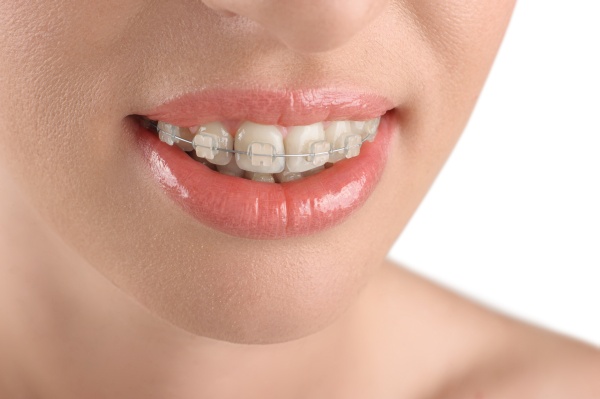Orthodontics 101: What is Dental Occlusion?

Dental occlusion is how a dentist defines how your upper teeth and lower teeth come together when you close your mouth. In other words, your dental occlusion is the exact same thing as your bite. We all have different bites, depending on what we are doing or feeling at any given time. The way the teeth come together as we chew is different from the way they close when we bite into an apple. Your bite is different when you are asleep or fully relaxed. When you are angry, anxious or otherwise distressed, your dental occlusion also changes. If you are wondering what this has to do with your oral health, keep reading to find out how orthodontics can help.
What determines a person's dental occlusion?
An individual's dental occlusion is the sum of many different factors. To begin with, the shape and size of a person's jaws determine how their teeth erupt. As an example, a jaw that is too small or narrow may cause overcrowded and protruding teeth. A jaw that is larger than the combined size of its teeth can cause a person to have spaced teeth. There are many other ways that the jaw can affect a person's bite.
The size, shape and overall health of the teeth can also determine if a person has a good bite or a malocclusion. In most cases, patients can avoid having a bad bite with good oral habits that start in childhood. But for some people, good oral habits are not enough. They may have an inherited or congenital malocclusion that needs to be corrected by an orthodontist. A person’s bite can also change because of trauma, teeth grinding, periodontal disease and missing teeth.
How dental occlusion affects oral health
Well-aligned teeth are easy to clean. They also allow a person to eat and speak with ease. In contrast, a bad bite can cause all sorts of problems. For example:
- Crowded teeth are hard to clean, which can lead to plaque buildup, tooth decay or gum disease
- A person who has a severe overbite or underbite may have trouble talking, breathing or chewing
- People with gapped teeth may have a hard time eating. They may also be self-conscious about their smile
- Malocclusion can also affect the shape and overall aesthetic of the face
Different malocclusions and their treatment
There are lots of ways that teeth can be misaligned and there are a few devices used in orthodontics that can help reposition the teeth. It turns out that each person has their own unique set of circumstances. As such, they need a treatment plan that is tailor-made for their situation. A typical treatment plan involves the use of an orthodontic device. Sometimes the treatment plan will include extraction or oral surgery. Generally speaking, how an orthodontist treats a bad bite depends on the class of malocclusion a person has. For example:
1. Class 1 malocclusion
A person with this type of malocclusion will have jaws that align with the rest of the skull, for the most part. This type of bad bite usually presents itself as moderately crowded, gapped or crooked teeth. Most people who need braces have a class 1 malocclusion. A dentist will usually treat this type of bad bite with braces, the most basic treatment in orthodontics.
2. Class 2 malocclusion: An overbite
A severe overbite happens when the lower jaw is smaller than the upper jaw. A person with an overbite will have front teeth that overlap the bottom teeth. An orthodontist will create a treatment plan to align both jaws. Treatment usually involves one or more orthodontic devices. In very severe cases, measures like tooth extraction and jaw surgery may be necessary.
3. Class 3 malocclusion: An underbite
A severe underbite occurs when the lower teeth overlap the teeth in the upper jaw. It happens when the lower jaw is larger than the upper jaw. Treatment often includes the use of an orthodontic device to reshape the lower or upper jaw. If the underbite is severe, an orthodontist might add surgery to the treatment plan.
Go through life with a beautiful smile
If you have a bite that could use some correcting, visit our practice in Coral Gables. We will work with you to get the right diagnosis and craft the perfect treatment for your teeth.
Let's get started…
Request an appointment here: https://www.gablesexceptionaldentistry.com or call Gables Exceptional Dentistry at (305) 203-4132 for an appointment in our Coral Gables office.
Check out what others are saying about our services on Yelp: Read our Yelp reviews.
Related Posts
Teens undergo various challenges and physical transformations, such as treatments to align their teeth, which can significantly impact their self-esteem and confidence. Invisalign® has revolutionized how teens and their parents straighten their teeth. Invisalign for teens can boost their confidence without the need for wires and brackets of traditional braces.One of the main concerns teens…
It can be scary to endure a cracked tooth, especially when it results from dental trauma. This review explains what to do in the event of a cracked tooth. It is important to take a deep breath and handle the immediate aftermath one step at a time.You can help ensure a cracked tooth (or a…
Are you considering Invisalign®? Read on to learn more about this teeth-straightening option. The path to a beautiful smile, complete with straight teeth, can be life-changing. Using braces to straighten teeth has been the standard practice for decades. However, new orthodontic treatments have emerged as a result of technological advances. One such innovation is Invisalign,…
Eating with Invisalign ® aligners will be slightly different from your usual routine, but it is entirely manageable with minor adjustments. We often receive questions about eating with Invisalign, so we have answered the most common ones in this review to help you navigate this aspect of your orthodontic treatment. Understanding what patients can and…
